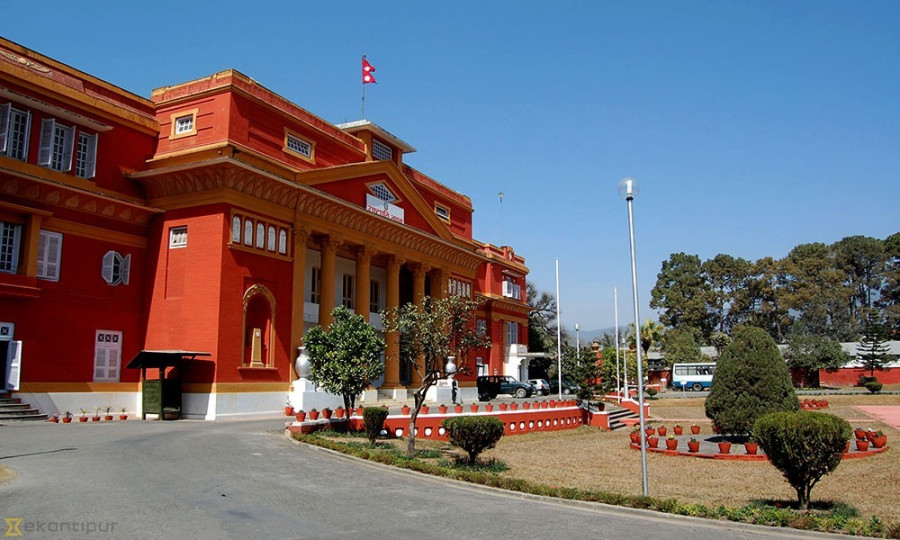Politics
After Oli’s reservations, President holds constitutional council ordinance
The ordinance, forwarded last month by the government, seeks to allow constitutional appointments to be made through a majority decision, as opposed to consensus.
Tika R Pradhan
An ordinance proposed by the government to change provisions in the Constitutional Council (Functions, Duties, Powers and Procedures) Act-2010 is stuck at the President’s Office as Prime Minister KP Sharma Oli, following criticism, has reservations.
The ordinance is aimed at modifying provisions in the Constitutional Council so that decisions can be made on the basis of a simple majority, as opposed to consensus.
Officials familiar with matters, however, say that Oli is no longer keen on following through with the ordinance after criticism from constitutional experts and the opposition.
In an interview with Kantipur TV on November 25, Oli had said that there was nothing to worry about as the ordinance had yet to be issued.
According to officials at the Prime Minister’s Office, Oli has changed his mind on the ordinance owing to criticism.
“The Cabinet sent the ordinance long ago citing its necessity but it won’t move ahead if the prime minister’s mind has changed,” said Health Minister Bhanubhakta Dhakal, who is a close confidante of Oli's.
As Oli is currently in hospital, a decision will be taken once he returns, said Surya Thapa, Oli's press adviser. "The government has yet to decide on the fate of the ordinance,” said Thapa.
Oli, who has undergone an appendectomy and eight rounds of dialysis since October 31, is currently recuperating at the Manmohan Cardiothoracic Vascular and Transplant Centre.
According to Sheetal Niwas, the President is “studying” the ordinance. Bhesh Raj Adhikary, chief personal secretary of President Bidya Devi Bhandari, said that the ordinance is not stalled and that the President is consulting with legal experts.
When the ordinance was forwarded last month, it immediately met with criticism, with legal and constitutional experts decrying it as an attempt to undermine the parliamentary system and bypass the House of Representatives when it is in recess.
Clause 6 (5) of the Constitutional Council (Functions, Duties, Powers and Procedures) Act-2010 states that “each matter submitted at the meeting shall be decided unanimously”. Sub-clause 6 says in case there is no unanimity among the Council chair and members, no decision shall be made.
“The chairperson shall call the next meeting to make a decision on the matter which was not decided pursuant to Sub-clause (6) and the decision shall be taken on that matter on the basis of the consent of the meeting. Provided that, even the said meeting fails to make a decision on the basis of the consent, the decision shall be taken by majority votes of the total members of the council,” states Sub-clause 7.
The Constitutional Council, headed by the prime minister, consists of the chief justice, Speaker and deputy Speaker of the House of Representatives, chairman of the National Assembly, and leader of the main opposition as members. The minister for law and justice also takes a seat when the appointment is related to the judiciary while the chief secretary functions as the secretary of the council.
The Council is mandated to recommend the chief justice, along with ambassadors and chairpersons and officials for various constitutional bodies.
A November 19 Cabinet meeting had decided to issue the ordinance, citing non-cooperation from Sher Bahadur Deuba, the leader of the primary opposition Nepali Congress.
The Congress party has long griped about the way appointments to the constitutional bodies have been made. It even boycotted the parliamentary hearing for five commission chairpersons, saying that the decisions were taken in the absence of the opposition leader.
The ruling party, however, had argued that it decided on the basis of consensus of all members present in the meeting after the leader of the opposition refused to participate.
The wrangling between the ruling and opposition parties has stalled appointments at various constitutional bodies, four years after the promulgation of the constitution. The Council has not been able to hold regular meetings due to Deuba’s absence.
Critics have also taken issue with the fact that the government is attempting to push through the changes through an ordinance. The constitution allows the issuance for an ordinance, which enables the government to pass laws when Parliament is not in session.
Article 114 (1) of the constitution, under ‘Provisions relating to Ordinance’, says: “If, at any time, except when both houses of the federal Parliament are in session, circumstances exist which render it necessary to take immediate action, the President may, on the recommendation of the Council of Ministers, promulgate an ordinance.”
Parliamentary experts, however, say that the executive should refrain from issuing such ordinances, unless it is extremely necessary, and that frequent issuance of ordinances without waiting for the House does not bode well for democracy and rule of law.
“Ordinance should be issued only in urgent cases,” said Chandra Kanta Gyawali, a constitutional expert. “Questions could be raised over why the vacant positions at the constitutional bodies were not fulfilled when the Parliament was in session and why the government is trying to issue ordinance when the House is just about to commence.”
The winter session of Parliament will commence in about two weeks.




 13.12°C Kathmandu
13.12°C Kathmandu














